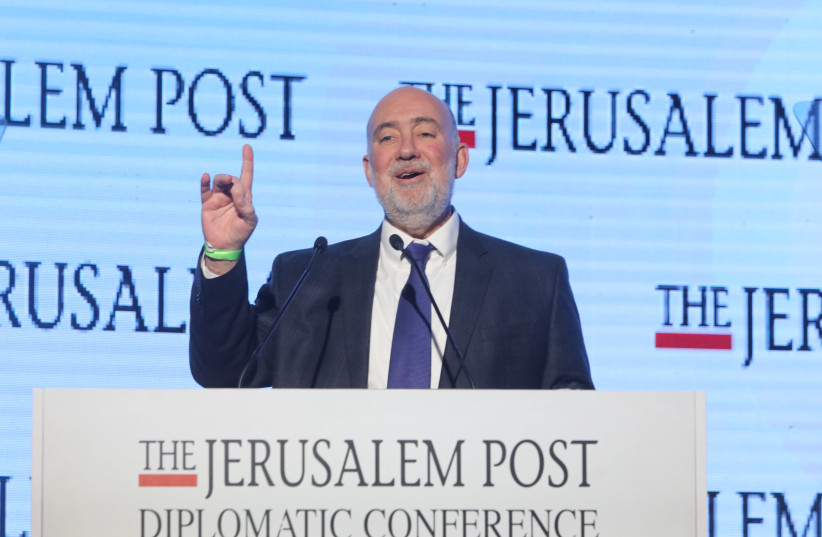Eight decades after the Holocaust, Germany is today Israel’s closest ally and largest trading partner in Europe.
Israel’s Ambassador to Germany, Ron Prosor, sees Israel-German ties as the number two strategic relationship that Israel has after the US. It’s a relationship, he says, that spans “all facets of culture, economy, university and research, and also military and defense cooperation.”
That’s why Germany’s affirmation of its commitment to Israel in a historic document defining its national security policy issued on Wednesday is most welcome.
The 39-page document is, in the words of German Chancellor Olaf Scholz, a “compass” reflecting Berlin’s “path toward more security and less dependence” in the wake of Russia’s war against Ukraine.
“We act in awareness of our history and of the guilt our country bears for unleashing the Second World War and for perpetrating the Shoah, that betrayal of all civilized values,” the document states. “Reconciliation with our European neighbors and responsibility for Israel’s right to exist remain an enduring obligation for us.”

It adds that Iran “is not only violating the human rights of its own citizens, but also continues to pursue its nuclear ambitions, producing ever more highly enriched fissile material, and has blocked efforts to revive the Joint Comprehensive Plan of Action of 2015. In addition, Iran’s missile program and its regional policy actions are fueling escalation and may give rise to new regional proliferation momentum.”
Germany supported Iran deal negotiations
This is important because Germany was a signatory of the JCPOA and has supported international negotiations with Tehran on reviving the deal. It is also significant because German lawmakers last Wednesday approved an advance payment for the purchase of the Arrow 3 air defense system from Israel for nearly €4 billion ($4.3b.), with an initial payment of 560 million euros this week. Berlin expects the long-range Arrow 3 system, that is designed to knock out ballistic missiles beyond the Earth’s atmosphere and offers protective cover for Germany and its neighboring European states, to be delivered in the fourth quarter of 2025.
The money for Arrow 3 reportedly comes from a landmark €100b. fund unveiled by Scholz to bolster the country’s defenses following Russia’s invasion of Ukraine.
What is behind Germany’s warming ties with Israel, its increasing cynicism regarding Iran, and its purchase of the Arrow 3?
There are a multitude of factors, not least of which is the warmth of the current chancellor who, like his predecessor, Angela Merkel, is a close friend of Israel. “The friendship between Germany and Israel is a precious gift,” Scholz said at the end of Prime Minister Benjamin Netanyahu’s visit to Germany in March.
“Iran cannot be allowed to obtain nuclear weapons,” Scholz declared unequivocally.
In remarks at a press conference with Scholz on March 16, Netanyahu thanked the chancellor for his commitment to Israel’s security, saying, “The friendship between Israel and Germany is rooted in a painful history. But it is also driven by shared hopes for a better future.”
The prime minister called Israel’s sale of the Arrow system to Germany a moment of historic importance. “Seventy-eight years ago we were nothing; we were wind-tossed leaves sent to the ovens of destruction,” he said. “Now, less than 80 years later, the representative of a sovereign Jewish state is talking to the leader of a new Germany, a different Germany, about having the Jewish state’s defensive systems protect the skies of Germany. Germany is helping Israel; Israel is helping Germany.”
In his September 2022 visit to Germany to mark 50 years since the Munich Massacre, President Isaac Herzog, in an address to the Bundestag, said that Israel is proud of its partnership with Berlin and appreciates “Germany’s contributions to Israel’s security and prosperity.”
According to Prosor, the wake-up call for Germany and Europe in was Iran’s recent military support for Russia.
“Germany and the whole of Europe will gain from this, as will the Israeli economy,” he said of the German decision to buy Arrow 3, which, he said, represents a significant upgrade in the strategic relationship between Israel and Germany.
We agree, and we look forward to seeing that relationship continue to deepen and grow in the years ahead.
